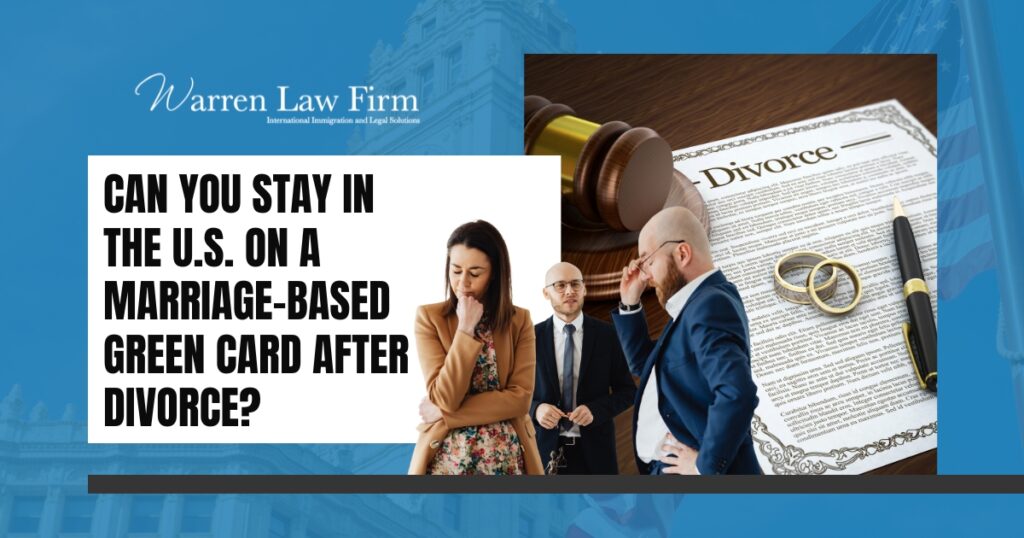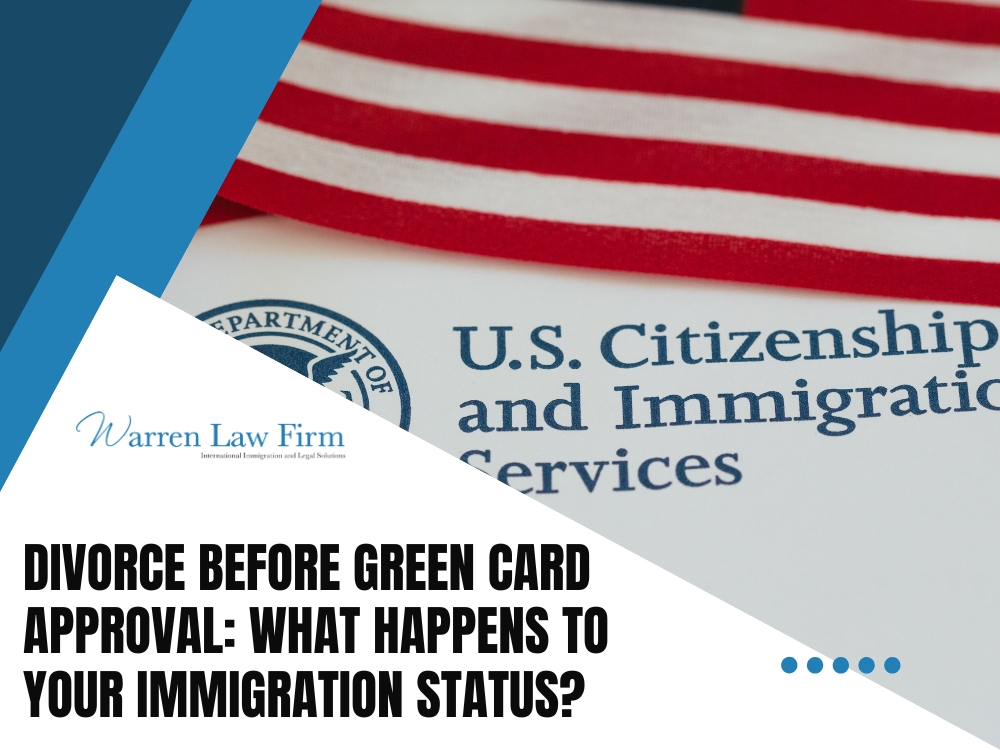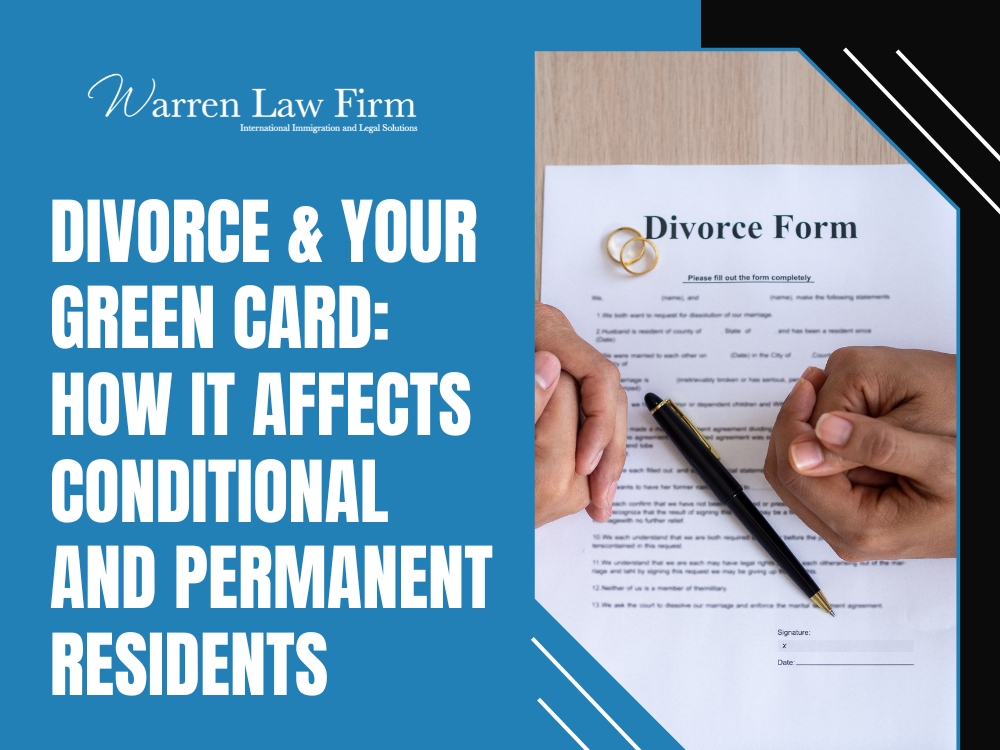Divorce After Getting a Green Card
Home » Guide to Green Cards From a Green Card Lawyer » Divorce After Getting a Green Card

Will you be able to remain in the United States if you move from your home country for a marriage-based green card in the U.S. and you end up getting a divorce?
Your immigration status could face various outcomes, since it hinges on how far along you are in the approval process for your green card.
Here are scenarios to consider if divorce interrupts your life, and options to help you move forward.
- Possible Scenarios Related to Divorce and Getting Your Green Card
- Divorcing before your green card gets approved
- Getting your conditional green card, but divorcing before the conditions are removed
- Divorcing after you get your permanent green card
Let’s take a look at each scenario in detail.
Table of Contents
Request A Consultation
Meet The Attorney
Angela D. Warren
With more than 20 years of immigration and business immigration experience, Angela Warren has helped hundreds of individuals, families and businesses.
Get The Immigration Help You Deserve
Divorcing Before Your Green Card Gets Approved
In order for you to get your green card, your U.S. citizen or lawful permanent resident spouse must file Form I-130, Petition for Alien Relative, with U.S. Citizenship and Immigration Services (USCIS) on your behalf.
They’ll also need to submit documentation about themselves, which may include a:
- Birth certificate
- Green card
- Naturalization certificate
- Passport
- Certificate of marriage to you

If you and your spouse divorce after your spouse submitted a petition for you to obtain a green card, but USCIS did not yet approve the petition, you won’t be able to get a green card because your eligibility was based on marriage, and the marriage ended.
As a result, you must return to your home country.
If the petition was granted before you divorced, but USCIS had not yet distributed your green card, you still have to leave the U.S.
Getting Your Conditional Green Card, But Divorcing Before the Conditions Are Removed
If your green card is approved and your marriage is less than two years old at the time of your approval, you’ll be given what’s called a conditional green card
This card expires after two years and is intended to deter people from getting married just to gain immigration benefits, which is a form of marriage fraud.
Removing Conditions After Two Years
Before your conditional green card expires, you and your spouse will have to file paperwork to have the two-year conditional status removed for you to receive a permanent green card.
You and your spouse will need to submit Form I-751, Petition to Remove the Conditions of Residence, and demonstrate that your marriage is bona fide, or genuine, and not simply one that is arranged to get a green card.
Included with your submission should be any documents that help demonstrate that your marriage is genuine.
Your paperwork needs to be submitted within 90 days of the day that your conditional green card expires.
If the Marriage Dissolves Before the Two-Year Conditional Period Ends
If your marriage dissolves before the two-year conditional period is up, and you would like to remain in the U.S. on your conditional green card, you’ll need to file Form I-751 (to remove conditions when the time comes) without your former spouse.
To do this, you will need to file documentation needed to waive the requirement for a joint filing.
A skilled immigration attorney can help you do this, and provide counsel about the types of documentation and evidence you’ll need to furnish in order to show that your marriage was real, and that you lived with your former partner as spouses.
Documents you should consider submitting include: a deed or lease showing joint ownership or a joint lease of property where you and your spouse lived, car registration and driver’s licenses showing your address, bank or financial statements showing a joint account, and mail addressed to the residence of you and your former spouse.
When it comes to proof of the more private aspects of your lives together, evidence may include:
- Photos of your wedding, vacations, birthdays, and holiday celebrations
- Receipts for gifts that you bought for each other
- Correspondence via card, letter or email
- Adoption certificates or birth certificates of children born during your union
- Insurance policies that list the other spouse as beneficiary
- Medical bills showing your names and address
An additional way to prove that you had a real marriage is to submit I-751 Affidavits, which are statements from friends and family.
These individuals share details about how they were witness to a genuine marriage. Affidavits can be especially helpful if you are not able to provide a wide range of proof by other means.
Your immigration attorney may suggest that you also include a written statement that offers your perspective on what caused your divorce—especially if you experienced physical or emotional abuse, or other kinds of violence, at the hands of your former spouse.
Supporting evidence that indicates why your marriage ended can include documentation of marriage counseling or criminal proceedings.
Divorcing After You Get Your Permanent Green Card
If you’re a permanent resident of the United States with a valid 10-year green card, you don’t have to worry about your status being affected if your marriage ends in divorce.
Despite the divorce, your status as an LPR will still remain intact. Furthermore, if it is time to renew your green card, you should be able to do so without experiencing any issues.
It is important to remember that legal permanent residence can sometimes be revoked in certain situations, such as if you commit a crime or fail to comply with certain immigration requirements.
However, simply getting divorced after receiving your green card is not grounds for legal permanent residency revocation.
Get The Immigration Help You Deserve
How Long To Wait For Divorce After Getting a Green Card?
Divorce is a difficult decision for anyone, but it can be even more complicated for conditional green card holders in the United States. There is no mandatory timeframe to wait to divorce after getting your green card. But your current status and ability to provide evidence of your genuine relationship determines if divorce affects your immigration status.
If you have a permanent green card, divorcing will not affect your immigration status. However, it might have implications if you plan to apply for U.S. citizenship. If you got your green card through marriage and divorce, you must wait five years (instead of three) before applying for U.S. citizenship. USCIS may factor in the timing of your divorce while closely assessing your situation.

Even if you have a conditional green card, divorce does not guarantee that you will lose your status if you were in a genuine relationship. Speak with an experienced immigration lawyer about your situation and they can let you know if they believe you have enough evidence of your bona fide relationship to remove the conditions on your green card despite a divorce.
Never stay in an abusive relationship to keep your immigration status. The Violence Against Women Act (VAWA) allows abused partners to apply for a green card without the knowledge of their abuser, even after divorce. This includes physical abuse, emotional abuse, verbal abuse, harassment, social isolation, sexual abuse, financial abuse, threats and intimidation.
If you have experienced abuse in your relationship and need a green card or to remove the conditions of your green card, we can help.
Even if you are not in an abusive relationship, it may still be in your best interest to divorce. Protect your mental health. Speak to an immigration attorney who can help you complete your waiver petition accurately and thoroughly.
Do You Need to Talk to an Attorney About How Divorce Can Affect Your Petition for a Marriage-Based Green Card?
No one wants to think that their marriage may not last. However, if you find yourself in this situation, it is important to know what may happen to your petition for a marriage-based green card. Warren Law Firm can help.
Our team is here to answer your questions and provide you with the legal guidance you need to begin moving forward. We understand that this is a difficult time for you and we are here to help in any way we can.
